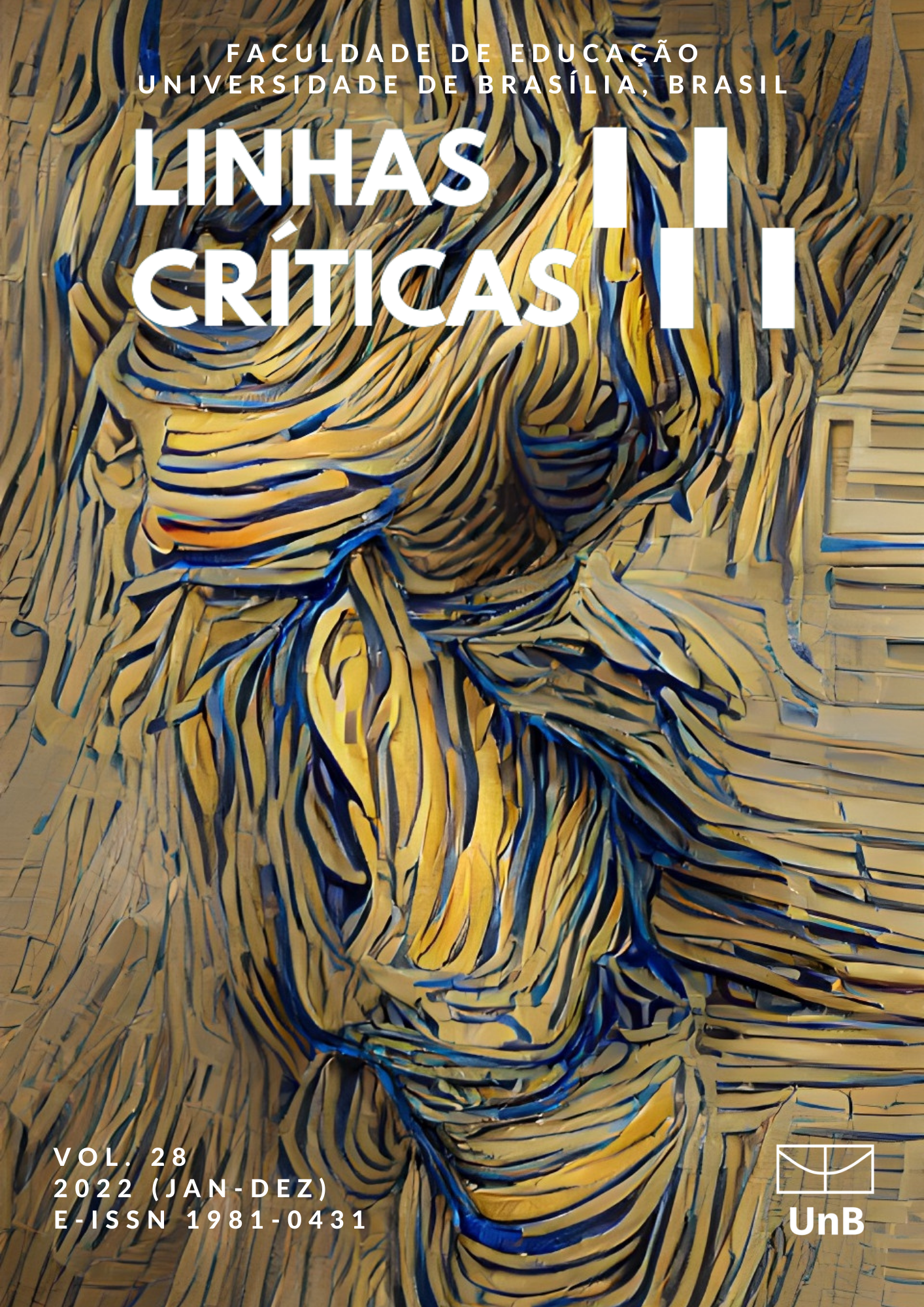Epistemological totalitarianism vs sensitive knowledge at school from the film Druk
DOI:
https://doi.org/10.26512/lc28202241203Keywords:
Epistemology, Critical Theory, School, CinemaAbstract
This essay aims to develop an aesthetical-critical discussion about the epistemological totalitarianism of instrumental reason present in a fictional school represented in the film Druk - Another Round (Vinterberg, 2020). Emphasizing the lack of sensitive knowledge, we dedicated ourselves to scrutinize the cinematographic work soundly and imagetically, using the methodology of film analysis and having as theoretical framework authors of Critical Theory. We conclude that despite the inaugural circumstances in the Danish school leading us to the construction of apparently innovative knowledge, at its core they preserved opacity and submission to traditional and totalitarian epistemologies.
Downloads
References
Aquino, T. L. (2021). Epistemologia da educação musical escolar: um estudo sobre os saberes musicais nas escolas de educação básica brasileiras. Goiânia: Editora da UFG.
Adorno, T. W. (2008). Minima Moralia: reflexões a partir da vida lesada. Beco do Azougue.
Adorno, T. W. (2010). Kierkegaard: a construção do estético. Editora da UNESP.
Adorno, T. W. (2012). Educação e emancipação. Paz e Terra.
Batalha, R. (2021). Indicado ao Oscar Druk – Mais uma Rodada finalizado no DaVinci Resolve. Panorama Audiovisual. https://panoramaaudiovisual.com.br/indicado-ao-oscar-druk-mais-uma-rodada-finalizado-no-davinci-resolve
Entel, A. (2008). Dialética de lo Sensible: Imágenes entre Leonardo y Walter Benjamin. Aidos Editores.
Fraser, N., & Jaeggi, R. (2020). Capitalismo em debate: uma conversa na teoria crítica. Boitempo.
Global Drug Survey. (2020). GDS2020 Key findings report. Global Drug Survey. https://www.globaldrugsurvey.com/wp-content/uploads/2021/01/GDS2020-Executive-Summary.pdf
Instituto de Cinema SP. (s.d.). Movimentos do Cinema: O que foi o Dogma 95? Instituto de Cinema SP. https://www.institutodecinema.com.br/mais/conteudo/movimentos-do-cinema-o-que-foi-o-dogma-95
Oliveira, K. A. S. (2014). Possibilidades da experiência estética na educação da infância. Appris.
Palmeira, C. (2021). Nascemos com déficit de álcool no sangue? Consultor de filme do Oscar nega. Tecmundo. https://www.tecmundo.com.br/cultura-geek/216175-oscar-consultor-filme-premiado-nega-temos-deficit-alcool.htm
Tiburi, M. (2014). Filosofia da Prática. Record.
Türcke, C. (2010). Sociedade Excitada: filosofia da sensação. Editora da Unicamp.
Türcke, C. (2012). Vício e fundamentalismo. Em A. A. S. Zuin, L. A. C. N. Lastória, L. R. Gomes (Orgs.). Teoria crítica e formação cultural: aspectos filosóficos e sociopolíticos (pp. 89-103). Autores Associados.
Vanoye, F., & Goliot-Lété, A. (1994). Ensaio sobre a análise fílmica. Papirus.
Vinterberg, T. (Diretor). (1998). Festa de família [Filme]. Nimbus Film.
Vinterberg, T. (Diretor). (2012). A caça [Filme]. Zentropa.
Vinterberg, T. (Diretor). (2016). A comunidade [Filme]. Zentropa.
Vinterberg, T. (Diretor). (2020). Druk – Mais uma rodada [Filme]. Nordisk Film; September Film; Vitrine Film/Synapse Distribution.
Published
How to Cite
Issue
Section
License
Copyright (c) 2022 Thaís Lobosque Aquino, Keyla Andrea Santiago Oliveira

This work is licensed under a Creative Commons Attribution 4.0 International License.
Authors who publish in this journal agree to the following terms:
-Authors maintains the copyright and grants the journal the right of first publication, the work being simultaneously licensed under the Creative Commons Attribution License which allows the sharing of the work with recognition of the authorship of the work and initial publication in this journal.
- Authors are authorized to enter into additional contracts separately, for non-exclusive distribution of the version of the work published in this journal (eg publish in institutional repository or as a book chapter), with acknowledgment of authorship and initial publication in this journal.
-Authorers are allowed and encouraged to publish and distribute their work online (eg in institutional repositories or on their personal page) at any point before or during the editorial process, as this can generate productive changes as well as increase the impact and the citation of published work (See The Effect of Free Access).



